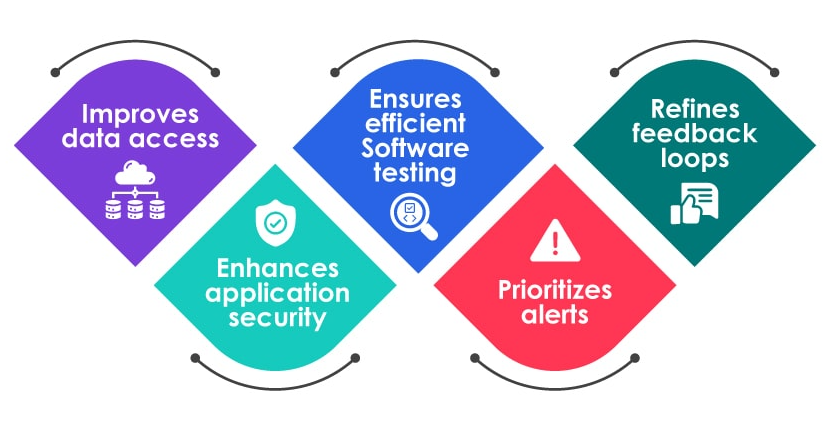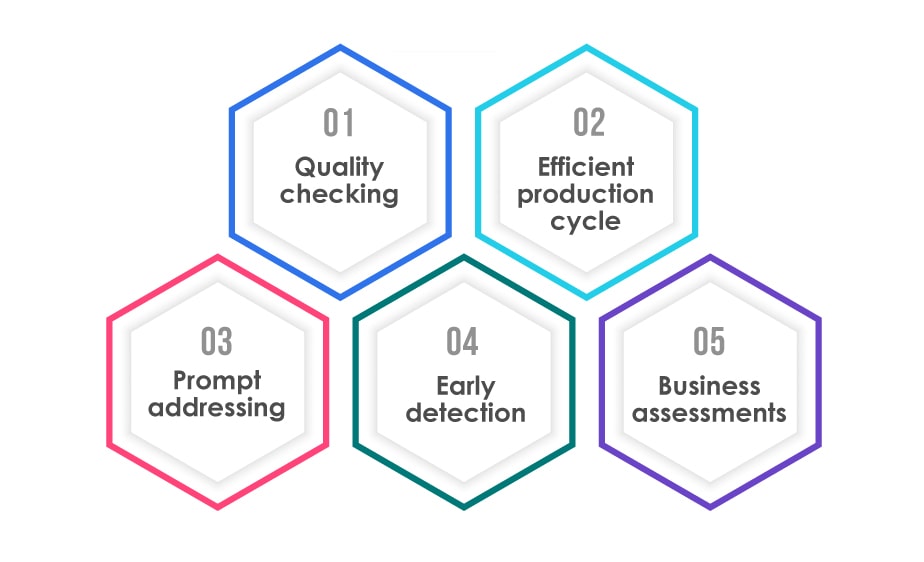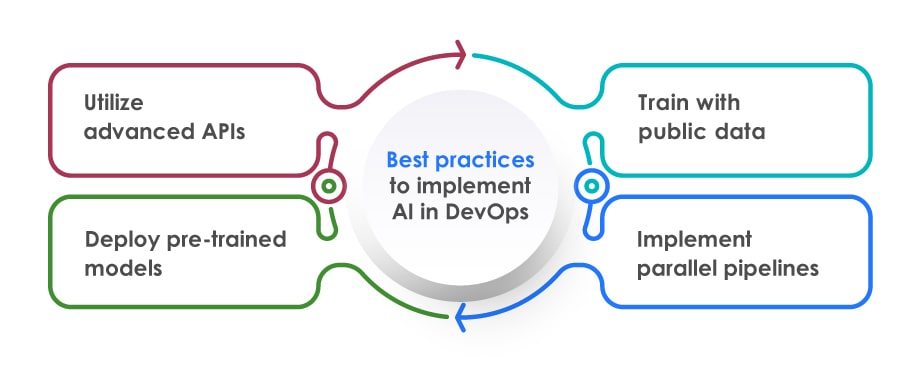Recommended Blogs
How Does AI in DevOps Enable Improved CX?
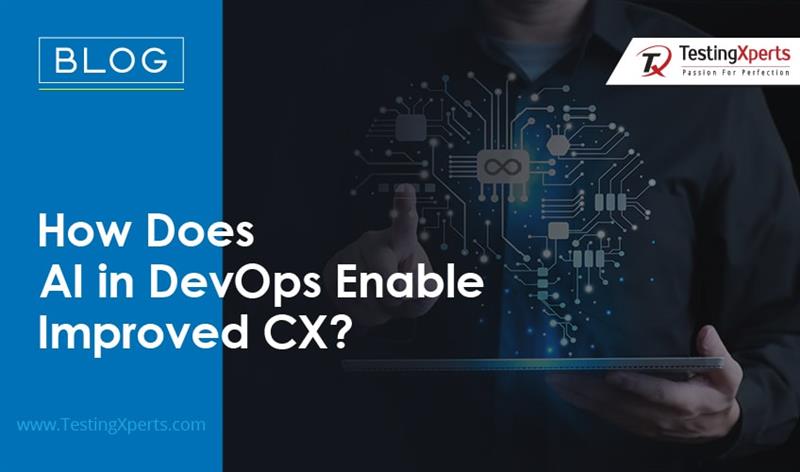
Table of Contents
Improving the existing customer experience (CX) is a key driver behind digital transformation initiatives. For digital businesses, CX is one of the primary metrics for measuring the quality and efficiency of their products and services. Artificial Intelligence (AI) and Machine Learning (ML) are trending these days; similar is the case with the DevOps world. These next-gen technologies transform DevOps by automating tasks and making the product development life cycle more customer-centric. From decision-making process improvements to automated operations and code quality enhancements, the future of AI in DevOps looks promising for enabling a great CX.
An overview of AI in DevOps
Today organizations are focused on being data-driven to incorporate the capabilities of AI & ML to achieve their ambition. The usage of AI & ML is set for tremendous growth in multiple folds in almost all the fields across industries such as healthcare, BFSI, retail & eCommerce, EduTech, etc.
Since the development of AI aims to leverage data, the inclusion of ML and AI in DevOps enables businesses to witness the true potential of digital transformation. For DevOps organizations running on real-time data, AI & ML enables automatic integration of technology components, intelligent QA analysis, bug fixes before the execution of release pipelines, automated reporting, and more.
How is AI in DevOps revolutionizing product releases?
Improves data access:
DevOps environment generates a lot of data. The teams sometimes face issues accessing that data, but Artificial Intelligence helps compile and organize data from multiple sources. This data helps to analyse and give a good picture of trends.
Enhances application security:
AI and ML can help detect Distributed Denial of Service threats by using algorithms to differentiate normal as well as abnormal conditions.
Ensures efficient Software testing:
AI collects and identifies the pattern of software testing data generated via various types of testing performed in a DevOps environment. This data is used by the DevOps teams to identify the root cause of errors in coding practices and fix them to increase the process efficiency.
Prioritizes alerts:
The DevOps team receives alerts with no priority tags. This makes it quite difficult for the teams to manage these alerts. AI helps the DevOps teams to prioritize alerts based on key metrics such as behavior, source of the alert, etc.
Refines feedback loops:
The primary function of DevOps is to use monitoring tools and collect feedback from every stage. AI tools use features such as log files, performance metrics, etc., to provide and apply intelligent decisions.
Impact of Leveraging AI in DevOps
By streamlining and accelerating every phase of the SDLC, AI takes DevOps to a new level of accuracy, efficiency, and credibility. Here are the key impacts DevOps teams experience when leveraging AI into their existing DevOps processes:
Quality checking:
AI facilitates the creation of comprehensive test patterns according to the learning from previous releases and leads to optimized and continuous delivery.
Efficient production cycle:
AI efficiently analyzes resource utilization and similar patterns to detect any memory leaks that may lead to production issues.
Prompt addressing:
AI and ML play a crucial role in dealing with sudden alerts by continuously training the system to identify the anomaly.
Early detection:
AI detects the issues and immediately alerts the Ops team for prompt mitigation that leads to business continuity.
Business assessments:
While DevOps pays high regard to understand code release for achieving business goals, AI tools analyze the pattern-based functionality of the application through user metrics and alert the respective business teams in case of any issue.
How does AI-powered DevOps enable improved CX?
Integrating AI in DevOps improves existing functions and processes and simultaneously provides DevOps teams with innovative resources to meet and even surpass user expectations. Here is how AI within DevOps enable improved CX:
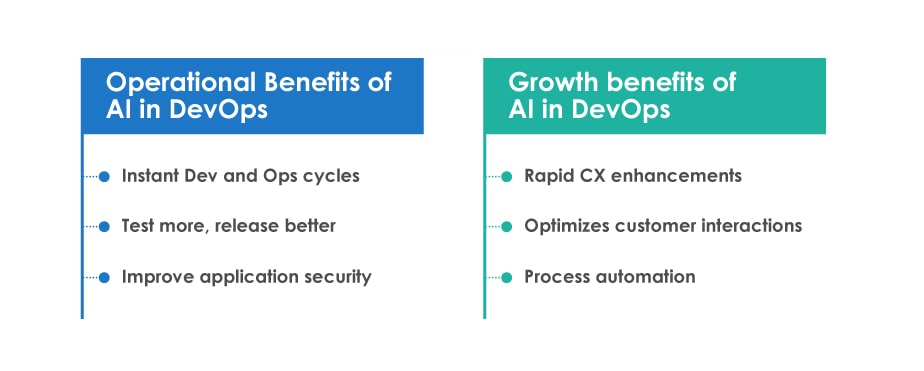
Operational Benefits of AI in DevOps
Instant Dev and Ops cycles:
With AI, DevOps teams can provide superior CX by optimizing application performance through rapid Dev and Ops cycles. Insights on user behavior enable the DevOps teams to prioritize the performance updates for future application releases that enhances the user experience.
Test more, release better:
DevOps teams test, code, release, and monitor application behavior. By leveraging AI, DevOps teams can accelerate these steps as well as identify and fix bugs promptly, enabling an amazing CX.
Improve application security:
AI-based algorithms improve the way DevOps teams detect and fix the security threats of the application. With the help of AI, DevOps teams can effectively highlight false positives, suspicious activities, and more.
Growth benefits of AI in DevOps
Rapid CX enhancements:
AI reveals key insights that directly impact CX for DevOps teams and help them rapidly make informed decisions. By leveraging AI, teams analyze the insights and refine their existing CX strategy by providing real-time responses to customer inquiries.
Optimizes customer interactions:
Businesses leverage AI-based interactions into all the leading customer-facing channels that personalize the CX and provide them with prompt resolutions.
Process automation:
AI enables DevOps teams to automate behind-the-scenes processes like email marketing, social media promotions, targeted automated marketing promotions, SMS promotions, etc.
These benefits, however, may only be achieved in full length when DevOps teams follow the best practices of implementing AI in DevOps, as described below:
Best practices to implement AI in DevOps
Utilize advanced APIs:
The Dev team should gain experience with canned APIs like Azure and AWS that deliver robust AI capabilities without generating any self-developed models. This facilitates accessible development where the Dev teams can work on enhancing the models as per use cases and integrate add-ons to create advanced patterns.
Train with public data:
DevOps teams should leverage public data sets for the initial training of DevOps models. This data may not be an exact match with the project’s requirements but can effectively fill the gap to build up the project visibility.
Implement parallel pipelines:
As AI is still evolving, DevOps teams should run parallel pipelines to ensure that the entire system does not come to a halt in case anything breaks. DevOps teams should gradually implement AI to effectively inline the project’s progress with AI adoption into the DevOps ecosystem.
Deploy pre-trained models:
Pre-trained or documented models accelerate the adoption of AI capabilities of DevOps ecosystems. Past search patterns can be utilized as references to recognize inputs or user behavior and make intelligent business decisions.
Future trends of AI and DevOps
Data fabric:
Enables flexible integration of data sources across multiple users and platforms that make data available on-demand irrespective of the data location. Data fabric will rely on analytics to reduce data management efforts by 70%
Cybersecurity mesh:
Enables comprehensive security solutions that can quickly verify identity, context, and policy adherence across cloud and non-cloud environments.
Hyperautomation:
Enables rapid identification and automation of all possible business and IT processes. Hyperautomation will help businesses leverage AI-driven DevOps with scalability and business model disruption.
Decision intelligence:
Enables businesses to improve their decision-making abilities via AI, augmented analytics, and simulations.
Total experience:
Enables a business to comprehend various touchpoints such as experiences of employees, customers, and application user experience to accelerate UX optimization.
Conclusion
By using a systematic DevOps approach, digital businesses have been promoting close coordination between their Dev, Ops, and customer support teams for faster development, and quicker updates. However, as the next-gen technologies transform DevOps by automating tasks and making the product development life cycle more customer-centric, it is evident that the future of DevOps will be influenced incredibly by AI.
By leveraging AI, DevOps-driven businesses can execute data-driven and continuous development and enhance the overall CX. As the DevOps teams deep dive into the user behavior, they can target and enhance the essential UX areas. Integrating AI-powered capabilities into the existing DevOps ecosystem will improve the traditional processes and help businesses be at the forefront of cutting-edge innovation.
Discover more
